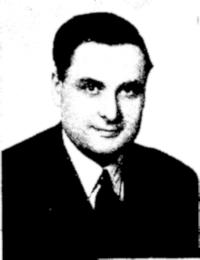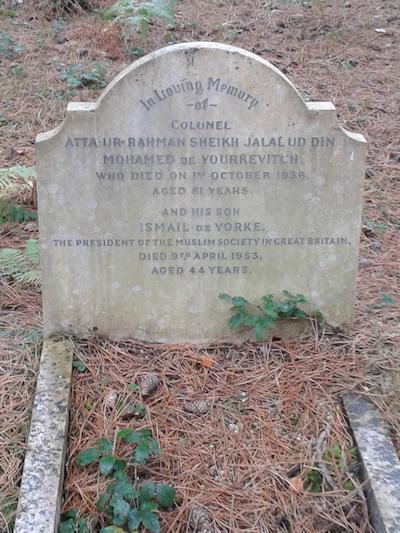| Home |
| History |
| Personalities Ismail de Yorke |
| Work |
| Photographic archive |
| Film newsreel archive |
| •
Contact us • Search the website |
Ismail de Yorke was closely associated with the Woking Muslim Mission and was President of the British Muslim Society for many years. He is mentioned in several issues of The Islamic Review from 1937 to the late 1940s. ObituaryGiven below is his obituary which appeared in The Islamic Review, July 1953, p. 33, and included the photo displayed below.
IN MEMORIAM The Late Ismail de Yorke AN APPRECIATION By ALEXANDER ENGELHARDT Ismail de Yorke, born of an Egyptian lady of the Royal House and a Russian father in Kensington, London, in 1909, was to all who had the pleasure of knowing him a just, humble and very lovable person whose presence will be greatly missed. I first met Wally, as he was affectionately called by his friends, in Oxshott, Surrey, where we attended kindergarten, being sent there by our respective parents, who were also very good friends. It was here and at this early age that his good nature manifested itself and his infectious laugh endeared hirn to me so much that we remained the firmest of friends for thirty-seven years. Educated ar St. Lawrence, Ramsgate, and Trinity College, Cambridge, he had the good fortune of having the best education money could give, and this fact, coupled with his charm and ability to mix easily with all types of men, turned hirn into a useful, God-fearing citizen. In 1929, while still at Cambridge, he married Miss Maria Kiknadze, a Caucasian, and a year later Nermine, his only child, was born. In the same year he passed his law examinations, was called to the Bar, and became a member of Gray’s Inn. He joined Sir Percival Clarke’s chambers and practised there until 1939. Answering the call to duty at the outbreak of the last great world war, he offered his services to the 12th Finsbury Rifles (which later became known as the 12th L.A.A. Regt., R.A.), an old-established Territorial unit. His ability to mix with everyone soon gained hirn many friends in the unit, and it was not long after the beginning of the war that the Commanding Officer named hirn for promotion to officer status. Unfortunately, however, his health was not good at this time, and it was soon decided by the authorities that he should be discharged. Thereafter, and until the end of the war, he helped the war effort by working in the Foreign Exchange Control at the Bank of England. As our families were so united, when his father died in the autumn of 1936, my father became even more arrached to Wally, and during the long weary years of the war they spent many long hours together in and around London, cheering up others and themselves in the knowledge that in the end right would prevail. Due to the fact that his home, on the ruins of which stands his present house, was bombed in 1940, he moved with his family and spent two years at the Shah ]ehan Mosque in Woking, Surrey. Ismail was passionately fond of tennis, and followed it closely, both as a player and as a spectator. The fortnight at Wimbledon was always awaited eagerly. His other hobbies included rnodel railway construction and model yacht racing. The latter he raced on the round pond in Kensington Gardens, and he was for a time Secrerary of the British Model Yacht Association. The long winter evenings were often spent with a handful of friends lisrening to music, chosen from his extensive and varied library of records. It is difficult to say whether these hobbies kept him young in spirit or whether it was his youthful mentality which caused hirn to choose such hobbies. In any event, in this quality lay his great charm. He was a boy with a good heart and a big smile. In religion a devout Muslim, he not only did a lor of work in bringing this religion to the forefront, but tried sincerely to live his life in a way that would bless and serve as an example to others. He was President of the Muslim Society in Great Britain for many years. The aftermath of war brought, as was to be expected, various problems, amongst which the housing shortage was one of great urgency. Ismail decided his legal qualifications could be put to good use if he joined an organization which tackled this important human problem. As a result of these thoughts, and with his usual desire to help the underdog, he joined the Hampstead and St. Pancras Rent Tribunal. He gave loyal and devoted service both to the Tribunal and to the many landlords and tenants who brought their grievances to him. One cannot write about Ismail without mentioning the great variety of his friends. They ranged literally from princes to East End barrow boys, and this fact, above all others, showed his true character, his love of humanity and his understanding that in the eyes of God each and every one of us, irrespective of colour or creed, is alike and a brother. — The Islamic Review, July 1953, p. 33 Parents and their marriageThe above obituary mentions that Ismail de Yorke was “born of an Egyptian lady of the Royal House and a Russian father”. To be more exact, his parents were the Egyptian princess Saliha Hilmi (1878–1953) and Serge Yourkevitch (d. 1936) who was a Russian count and diplomat from St. Petersburg. His acceptance of Islam and their Islamic nikah was described by Khwaja Kamal-ud-Din in his report from the Woking Mission dated 24 December 1913. He wrote:
Grave of father and sonIsmail de Yorke and his father are buried in the same grave at the Brookwood cemetery, near Woking. Below is a photograph of their grave taken on 13 November 2014 by the Website Administrator of this website, Dr Zahid Aziz:
Woking Mosque and Mission related activitiesIn the archives available on this website, there are some photographs of Ismail de Yorke at functions held at the Woking Mosque, and reports of meetings in Woking and London, chaired by him or at which he made a speech. The list below summarizes all such references to him, and provides links to the source where details can be read.
|
the successor of the Woking Muslim Mission.

